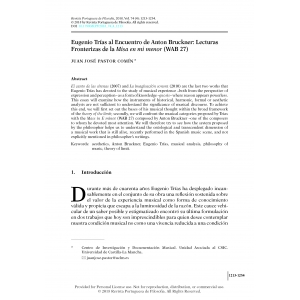Auchmann, Michaela. Anton Bruckners Messe Nr. 2 E-Moll (WAB 27). Zur musikalischen Gestaltung, Wirkungs- und Rezeptionsgeschichte. Viena: Ph.D. thesis, University of Vienna, 1991.
Bader R. (ed.) Springer Handbook of Systematic Musicology. Berlin, Heidelberg: Springer Handbooks, 2018.
Barjau Riu, Eustaquio. “La música en la obra de E. Trías”. In La filosofía del límite: debate con Eugenio Trías, edited by Jacobo Muñoz Veiga y Francisco José Martínez Martínez, 237-56. Madrid: Biblioteca Nueva, 2005.
Bokulich, Clare. “Contextualizing Josquin’s Ave Maria… virgo serena”. The Journal of Musicology 34, no. 2 (2017): 188-240
Bruckner, Anton. Messe Nr. 2 in E Moll. Wien: Universal-Edition, 1917.
Bruckner, Anton. Gesammelte Briefe, Neue Folge, ed. Max Auer. Regensburg: Gustav Bosse Verlag, 1991.
Carver, Anthony F. “Bruckner and the Phrygian Mode”. Music & Letters 86, no. 1 (2005): 74-99.
Eliot, T. S. Cuatro cuartetos, Madrid: Cátedra, 1999.
Fellerer, Karl Gustav. “Bruckners Kirchenmusik und der Cäcilianismus”. Österreichische Musikzeitschrift 29 (1979): 404-12.
Ferguson, J. S. A conductor’s analysis for performance of Mass in E Minor by Anton Bruckner. Ph. D. Dissertation. Madison: University of Wisconsin, 1987.
Fuentes Feo, Javier. “La obra de arte como experiencia del límite: una aproximación estética al pensamiento de Eugenio Trías”. Revista de occidente, no. 329 (2008): 57-80.
García Lomas Gago, Luis Javier. “El papel de la música en la obra filosófica de Eugenio Trías: el ejemplo de J. S. Bach”. Estudios filosóficos 66, no. 193 (2017): 557-563.
Garrat, James. Palestrina and the German Romantic Imagination. Cambridge: Cambridge University Press, 2004.
Gault, Dermot. The New Bruckner: Compositional Developmental and the Dynamics of Revision. London, New York: Routledge, 2016.
González Valenzuela, Juliana. “La ética del límite”. In La filosofía del límite: debate con Eugenio Trías, edited by Jacobo Muñoz Veiga y Francisco José Martínez Martínez, 175-92. Madrid: Biblioteca Nueva, 2005.
Graham, W. A.. Mass in E Minor: A study of Anton Bruckner’s unique musical expression. Ph. D. Dissertation. Stanford: Stanford University, 1974.
Green, J. D. A conductor’s guide to nineteenth-century choral-orchestral works. Lanham, MD: Scarecrow Press, 2008.
Gruber, G. W. Die Credo-kompositionem Anton Bruckners. In Anton Bruckner und die Kirchenmusik, edited by Wessely Othmar, 129-43. Wien: Musikwissenschaftlicher Verlag, 1985.
Guardans, Teresa. Indagaciones en torno a la condición fronteriza. Tesis doctoral dirigida por el Dr. Eugenio Trías. Barcelona: Universitat Pompeu Fabra. 2006.
Habert, Johannes Evangelist. “Die Auff¨uhrung der Bruckner’schen Fest-Messe bei der feierlichen Einweihung der Votivkapelle des Mariä-Empfängniss-Domes in Linz am 29. September d.J”. Zeitschrift für katholische Kirchenmusik 2 (1869): 99-100.
Hadot, Pierre. El circulo de Eranos III. Hombre y sentido. Barcelona: Anthropos, Editorial del hombre, 2004.
Haslbeck, F. B. y D. Bassler. “Music From the Very Beginning – A Neuroscience-Based Framework for Music as Therapy for Preterm Infants and Their Parents”. Frontiers in Behavioural Neurosciences, 12, no. 112 (2018), https://www.frontiersin.org/articles/10.3389/fnbeh.2018.00112/full. doi: 10.3389/fnbeh.2018.00112
Higuero, Francisco Javier. “Argumentación discursiva en torno al límite en Ciudad sobre ciudad de Eugenio Trías”. Alfa: revista de la Asociación Andaluza de Filosofia 7, no. 13 (2003): 55-68.
Hillis, M. “Anton Bruckner’s Mass in E Minor: a performer’s guide”. Journal of the Conductors Guild, 12, no. 3-4 (1991): 82-95.
Hillis, M. “Anton Bruckner’s Mass in E Minor: a performer’s guide”. Journal of the Conductors Guild, 21, no. 1-2 (2000): 23-24.
Howie, Crawford; Paul Hawkshaw; Timothy Jackson. Perspectives on Anton Bruckner. London, New York: Routledge, 2016.
Howie, Crawford. “Bruckner and the motet”. In The Cambridge Companion to Bruckner, edited by John Williamson, 54-65. Cambridge: Cambridge University Press.
Janata, Petr “The Neural Architecture of Music-Evoked Autobiographical Memories”. Cerebral Cortex 24 (2009), 1-16.
Kérenyi, Karl. Arquetipos y símbolos colectivos. (Círculo de Eranos). Barcelona: Anthropos, 1994.
Kinder, K. W. The wind and wind-chorus music of Anton Bruckner. Westport, CT: Greenwood Press, 2000.
Kramer, Lawrence. Classical Music and Postmodern Knowledge. Berkeley: University of California Press, 1995.
Lee, Namjai. Anton Bruckner’s treatment of the Credo text in his last three masses. Ph. D. Dissertation. Denton: North Texas State University, 1985.
Leggieri, Melissa, Luis Fornazzari, Michael Thaut, Joseph Barfett, David G. Muñoz, A. Schweizer y Corinne Fischer, “Determining the Impact of Passive Music Exposure on Brain Activation and Functional Connectivity Using FMRI in Patients with Early Alzheimer’s Disease”, The American Journal of Geriatric Psychiatry 26, no. 3 (2018), https://www.sciencedirect.com/science/article/pii/S1064748118301660, https://doi.org/10.1016/j.jagp.2018.01.164
Martinez Pulet, José Manuel. Variaciones del límite. La Filosofía de Eugenio Trías, Tesis doctoral dirigida por Ángel Gabilondo. Madrid: Universidad Autónoma de Madrid, 2001.
Martínez-Pulet, José Manuel. Variaciones del límite. Barcelona: Noesis, 2003.
Mathews, Theodore Kenneth. The Masses of Anton Bruckner: A Comparative Analysis. Ph. D. Dissertation. Michigan: University of Michigan, 1974.
McCullough, James. “Anton Bruckner – Holy Minimalist”. The Bruckner Journal 19, no. 30 (2015): 1-6.
McPherson, Gary E., Graham E. Welch (eds.), Music and Music Education in People’s Lives: An Oxford Handbook of Music Education. Oxford: Oxford University Press, 2018.
Merrick, Paul. Revolution and Religion in the Music of Liszt. Cambridge: Cambridge University Press, 1987.
Newlin, D. “Bruckner’s three great masses”. Chord and Dischord, 2, no. 8 (1958): 3-16.
Nowak, L.. “A study of the formal proportions in the Mass in E Minor by Anton Bruckner”. In A commemoration by the Osterreichische Akademie der Wissenschaften for the 150th anniversary of the birth of Anton Bruckner, edited by O. Wessely, 249-70. Austria: Osterreichische Akademie der Wissenschaften, 1975.
Pérez-Borbujo Álvarez, Fernando. “Eugenio Trías (1942-2013): la filosofía del límite”. Teorema: Revista internacional de filosofía 32, no. 2 (2013): 237-245.
Phillips, Peter. “Reconsidering Palestrina”. Early Music,22 (1994): 575-585.
Proske, Carl (ed.). Musica divina. Regensburg: Friedrich Pustet, 1853.
Ramos Berrocoso, Juan Manuel. “La propuesta filosófica del Eugenio Trías sobre el límite: pistas para un diálogo teológico”, Salmanticensis 45, no. 2 (1998): 295-329.
Reish, G. N. Eclectisism and Stylstic interaction in Anton Bruckner’s Mass in E Minor. Master Thesis. Washington: University of Georgia, 1993.
Sacks, Oliver. Musicofilia. Barcelona: Anagrama, 2010.
Schmidt, M. D.. Three masses of Anton Bruckner. Master thesis. Michigan: University of Michigan, 1962.
Segade, Carlos. “El ser limítrofe: una aproximación al concepto de persona en la filosofía de Eugenio Trías”. Quien: revista de filosofía personalista 6 (2017): 101-116.
Solares, Blanca. “Filosofía del límite o pensar en el vértigo”. Theoría. Revista del Colegio de Filosofía 13 (2002), 33-43.
Sucasas, Alberto. La música pensada. Sobre Eugenio Trías. Madrid: Biblioteca Nueva, 2013.
Tarasti, Eero. Myth and Music. New York: Walter de Gruyter & Co., 1979.
Trías, Eugenio. La filosofía y su sombra. Barcelona: Seix Barral, 1969.
Trías, Eugenio. Lo bello y lo siniestro. Barcelona: Seix Barral, 1982.
Trías, Eugenio. Filosofía del futuro. Barcelona: Ariel, 1983
Trías, Eugenio. Lógica del límite. Barcelona: Destino. 1991.
Trías, Eugenio. Ciudad sobre ciudad. Barcelona: Destino, 2001.
Trías, Eugenio. Música y filosofía. Oviedo: Universidad de Oviedo, 2007.
Trías, Eugenio. El canto de las sirenas. Argumentos musicales. Barcelona: Galaxia Gutenberg y Círculo de Lectores, 2007.
Trías, Eugenio. La imaginación sonora. Argumentos musicales. Barcelona: Galaxia Gutenberg y Círculo de Lectores, 2010.
Vilar, Gerard. “La aporía estética: arte, límite y verdad en E. Trías”. Estudios filosóficos 64, no. 185 (2015): 7-22.
Wagner, Manfred. “Liszt und Bruckner – ode rein Weg zur Restauration sakraler Musik”. In Liszt-Studien I. Kongress Bericht Eisenstadt 1975, edited by Wolfang Suppan, 225-33. Graz: Akademische. Druck- u. Verlagsanstalt, 1977.
Welles, E. “Anton Bruckner and the process of musical creation”. The Musical Quarterly 24 (1938): 265-90.
Williamson, John (Ed.). The Cambridge Companion to Bruckner. Cambridge: Cambridge University Press, 2011.










